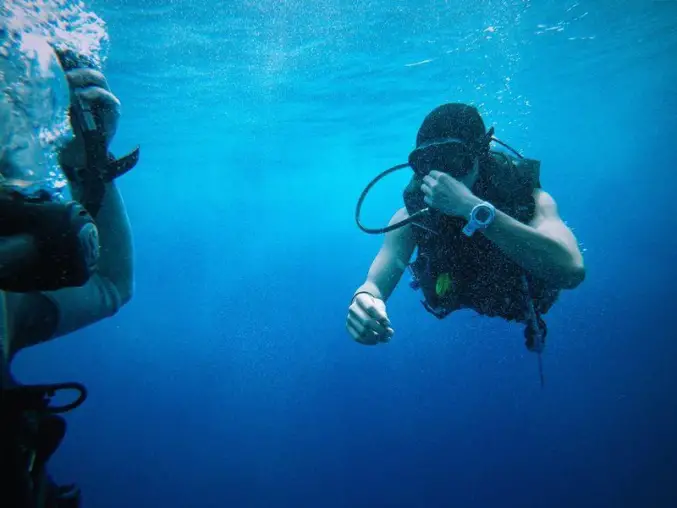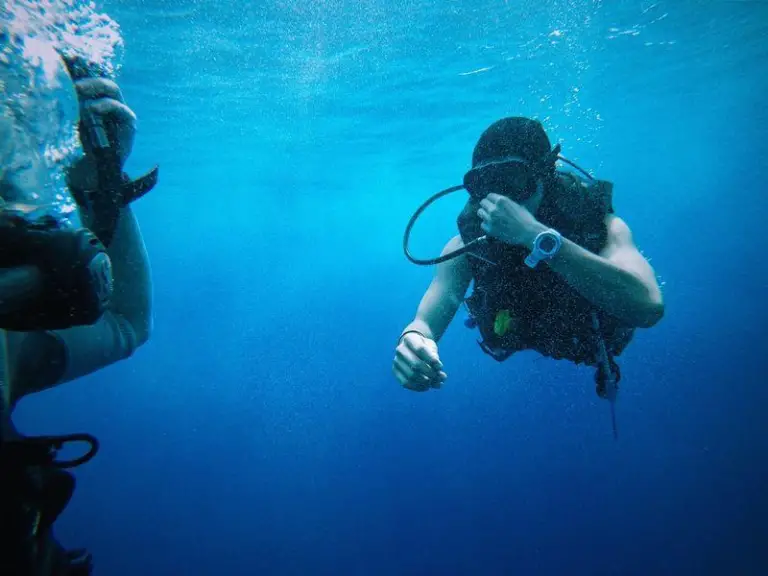
Are you a beach lover who adores spending sunny days by the sea with your loyal fur companion? If so, you might have wondered whether your furry friend’s frolics in the ocean could unwittingly summon sharks.It’s a common concern among dog owners, but fret not. In this comprehensive guide, we’ll dive deep into the question of whether dogs truly attract sharks.
Sharks are primarily attracted to the scent of fish and other marine creatures, making the presence of dogs in the water less likely to attract these apex predators. However, it’s crucial to remain vigilant and follow safety precautions to ensure your beach outings with your four-legged buddy are both fun and safe.
We’ll equip you with valuable tips, from choosing the right beach for your dog’s playtime to understanding shark behavior and the importance of responsible pet ownership. So, you can enjoy the sun, surf, and sand with your furry friend without unnecessary worry about shark encounters.
Dogs and the Marine World

When your furry friend joins you for a refreshing swim in the ocean, it’s natural to wonder whether their presence might attract sharks. After all, dogs can create splashes and commotion in the water, potentially catching the attention of curious marine creatures. However, it’s essential to put these concerns into perspective.
Scientific research and experts in marine biology offer reassuring insights. While sharks have an acute sense of smell and are drawn to scents associated with potential prey, they are not particularly interested in dogs. Sharks typically prioritize the scent of fish, seals, and other marine animals they naturally hunt. Dogs, as land mammals, don’t emit the same underwater scents that might attract sharks.
In fact, there’s no conclusive evidence to suggest that dogs are more appealing to sharks than any other land mammals. So, whether your canine companion is splashing in the shallows or fetching a ball in the surf, you can continue to enjoy your beach days worry-free. It’s important, however, to remain vigilant, follow safety guidelines, and exercise responsible pet ownership to ensure a safe and enjoyable experience for both you and your furry friend.
How Sharks Feel Their Surroundings
Sharks have a remarkable array of senses, including smell and sound, to locate their prey. However, they sometimes misidentify their targets due to poor visual perception, especially in murky waters or low light conditions. It’s crucial to understand that sharks aren’t on the lookout for dogs or humans; they’re merely investigating their surroundings.
Keeping Dogs Safe
While the chances of your dog attracting a shark remain slim, it’s essential to prioritize their safety in the ocean. Sharks are naturally curious beings and may approach your dog out of curiosity. To ensure both your dog’s safety and the well-being of marine life, adhere to responsible pet ownership practices:
- Keep your dog on a leash, especially in areas known for shark activity.
- Maintain a watchful eye on your furry friend and prevent them from straying too far.
- Assess your dog’s health and swimming abilities to ensure they can handle the ocean’s currents and waves.
Types of Sharks and Their Unique Features
While some shark species have a higher rate of shark attacks, it’s essential to remember that sharks do not specifically target dogs or humans. Here’s a closer look at the characteristics of three such species:
Great White Sharks
These iconic predators primarily prey on seals and other marine mammals. While they may seem intimidating, they generally pose minimal threats to humans and dogs. Nevertheless, it’s advisable to avoid swimming near seal colonies and consider wearing dark-colored swimwear to reduce the chances of being mistaken for prey.
Tiger Sharks
Named for their distinctive striped skin pattern, tiger sharks are opportunistic feeders with a broad prey range. Although they don’t target humans or dogs, they can become more aggressive when hungry. Keep a safe distance from waters known for tiger shark presence and remain vigilant while swimming.
Bull Sharks
Bull sharks are unique among the mentioned species because they can adapt to both saltwater and freshwater environments. This adaptability occasionally leads them into unexpected areas. While they are generally more aggressive, there’s no direct evidence suggesting they find dogs particularly appealing. However, heed shark warnings and avoid swimming in areas with bull shark sightings.
Safety by the Shore
To minimize the risk of shark encounters, follow these precautions while enjoying beach outings with your dog:
- Avoid swimming in areas with abundant marine life or fishing activity, as these can attract sharks.
- Stay close to shore, especially if your dog is with you.
- Swim during daylight hours, as sharks are more active during low-light times.
- Observe posted shark warnings and be aware of feeding times.
- Supervise your dog closely, and consider outfitting them with a brightly colored life vest for visibility.
- Keep your dog within your line of sight and near the shore.
- Pay attention to unusual marine activity, such as fish schools or bird behavior, as these can signal shark presence.
Are Certain Dog Breeds More Attractive to Sharks?

There is no evidence to suggest that specific dog breeds are more alluring to sharks. Regardless of the breed, all dogs can create movement and splashing in the water, which may attract a shark’s curiosity. So, whether you have a pug or a golden retriever, similar precautions apply when bringing your furry friend to the beach.
How Dogs’ Movements Affect Shark Behavior
A dog’s movements in the water can produce splashing and sounds that might catch a shark’s attention. This curiosity could draw them closer to investigate. Sharks are opportunistic feeders and may be attracted to anything unusual in their environment. However, this doesn’t mean they are targeting dogs specifically. Most shark interactions with dogs or humans are incidental and a result of mistaken identity.
Shark Attacks: Causes and Preventions
The fear of shark attacks can loom large, but statistically, the odds of such an incident are incredibly low. According to the International Shark Attack File, in 2022, there were only 57 reported shark attacks worldwide. In the United States, the chances of dying due to a shark attack are estimated at 1 in 4,332,817, a risk much lower than everyday activities like driving.
Trends in Locations of Shark Attacks
While shark attacks can occur anywhere, certain regions experience more incidents. States like Florida, California, and Hawaii report higher numbers due to their abundant marine life, popular beaches, and recreational water activities, leading to more interactions between humans and sharks.
Conclusion
The idea that dogs are shark magnets at the beach is largely a misconception. Scientific evidence supports the notion that dogs are no more attractive to sharks than other land mammals. By following safety measures and responsible pet ownership practices, you can savor your beach days with your loyal canine companion without undue worry about shark encounters. So, leash up your furry friend and hit the shores for some unforgettable, worry-free beach fun.









